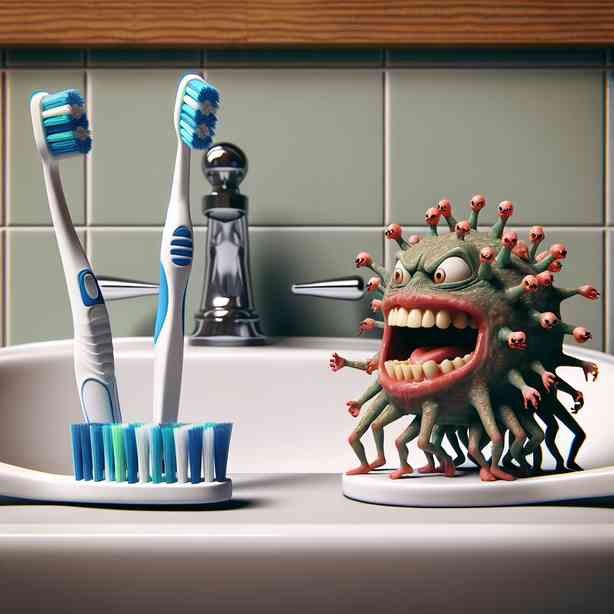
Sharing a toothbrush may seem like a harmless act, especially among close friends or partners, but it is essential to understand the significant health risks associated with this practice. Oral hygiene is a crucial aspect of overall health, and a toothbrush is one of the most personal items someone can own. This article aims to delve deeply into the reasons why sharing a toothbrush should always be avoided, not only to maintain oral health but also to protect overall well-being.
To begin with, a toothbrush is a breeding ground for bacteria. After brushing, toothbrushes can harbor millions of bacteria, including those associated with gum disease, tooth decay, and even systemic diseases. When you share a toothbrush with another person, you expose yourself to their unique bacteria, which can lead to various oral health issues. The human mouth is home to around 600 species of bacteria, and while many of these are harmless, some can be pathogenic. Sharing a toothbrush allows harmful bacteria to transfer between individuals, creating a risk of infection and disease.
Moreover, transmitting bacteria through a shared toothbrush can significantly impact immunocompromised individuals. People with weakened immune systems, such as those undergoing chemotherapy or living with autoimmune diseases, are particularly vulnerable to infections. For them, even minor exposures to unfamiliar bacteria can result in severe health consequences. By sharing a toothbrush, you may unknowingly increase the risk of introducing harmful pathogens into their systems, which could exacerbate their health challenges.
Another crucial aspect to consider is the potential for cross-contamination with various viruses. Oral health can directly affect and be affected by the body’s overall health. Certain viruses, such as herpes simplex virus or the cold sore virus, can easily transfer through saliva. When you share a toothbrush, you are not just exchanging bacteria; you are also risking the transfer of viral infections. This is particularly concerning because many viral infections can be asymptomatic at first, allowing the virus to spread without either party being aware of the potential consequences.
Additionally, sharing a toothbrush can lead to the spread of bloodborne pathogens. Conditions such as hepatitis B or C, as well as HIV, can be transmitted through blood. If one person has a gum infection or a bleeding gum during brushing, the risk of blood-to-blood contact increases, especially if the toothbrush has any residual blood on it. This risk is often overlooked, but it underscores the importance of keeping personal hygiene products, like toothbrushes, strictly personal.
Furthermore, using someone else’s toothbrush can cause discomfort or improper cleaning. Different individuals have varying teeth and gum conditions; one person may have sensitive gums while another may have more robust oral tissue. When you use a toothbrush not suited for your specific oral needs, you run the risk of causing damage to your gums and teeth. The bristles on someone else’s toothbrush may have varying hardness levels or be worn down differently, leading to inadequate cleaning or even damage during brushing.
The aspect of personal habits must also be highlighted. Your oral hygiene routine may differ significantly from someone else’s. From the type of toothpaste used to the frequency of brushing, these differences play a crucial role in maintaining oral health. When you share a toothbrush, you compromise not just cleanliness but also the specific practices that you have tailored to your own health needs.
In terms of emotional considerations, sharing a toothbrush can also introduce an uncomfortable dynamic into relationships. Many may feel uneasy or even grossed out at the thought of using someone else’s toothbrush. This discomfort could create tension in personal relationships, adding a layer of complexity that often often goes undiscussed. It is essential to respect personal boundaries regarding hygiene, helping to foster healthier, more trusting relationships.
The best practice is to ensure that each person has their own toothbrush and follows appropriate hygiene practices. Replace your toothbrush every three to four months, or sooner if the bristles become frayed. Store your toothbrush in an upright position and allow it to air dry to minimize bacterial growth. Avoid storing it in enclosed containers and do not share toothbrushes or any oral hygiene items with anyone.
Additionally, regular dental check-ups are invaluable in maintaining oral health. A dentist can provide further insight into the ideal oral care practices and address specific concerns regarding bacteria, infections, or the appropriate types of toothbrushes and dental products to use.
In summary, sharing a toothbrush poses several health risks that far outweigh any perceived benefits. From the transmission of harmful bacteria and viruses to the potential for emotional discomfort in relationships, the drawbacks are significant. Maintaining personal hygiene items as strictly personal is vital for both your health and that of others. By respecting these boundaries, you not only safeguard your own oral health but also foster a culture of care and respect around personal hygiene among your loved ones.
Taking excellent care of your oral hygiene is a valuable practice that contributes to your overall health and well-being. So, the next time you’re tempted to share a toothbrush, remember the potential risks involved. Prioritize your health and comfort by ensuring that your toothbrush is yours and yours alone.


